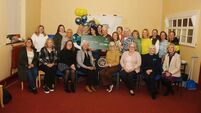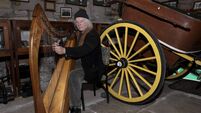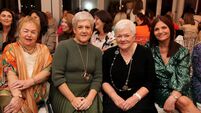Local Notes: Brickens market draws a crowd for Meals on Wheels

Santa visited Ballyhaunis Golf Club to meet the future members of the club! Picture: Glynn's Photography
There was a full house on December 17 for the annual Christmas market in Brickens Community Centre in aid of the local Meals on Wheels service. Among the stallholders was local cheese firm Velvet Cloud, which produces one of its popular cheddars with milk from the Waldron herd in Cloonbook. The company was showcasing its new sheep milk soap as well as its popular cheese and yoghurt range.
Also present was Logboy potter Chris Ganley and Bekan-based Margaret Mary McGrath showcasing her quality knitwear. Richard Morley, who was selling his ‘Bekan Honey,’ explained how his various hives are active even in winter, when the milder days allow the bees to forage from heather and ivy.
Richard is also a member of Ballyhaunis Beekeepers Association which had a stall at the recent Ballyhaunis Christmas market. Present also at the market was Marie Kilcullen of Holistic Therapies in Claremorris who’s originally from Moate near Ballyhaunis.
Operated under Brickens, Logboy, Tulrahan Housing Association Co and located at the Lohan Park Group Home, the Brickens Meals on Wheels service has to regularly raise funds to match the grants it receives from the Health Service Executive and Department of Social Protection. The service is also supported by Mayo South West Development Co. The service can be contacted at brickesnhousing@gmail.com.
News that CCTV cameras are set to be reintroduced by litter wardens in 2024 under a new national legal framework will be welcome given that only one litter fine was issued in Ballyhaunis this year, according to Mayo County Council.
A fall in the number of fines in 2023 (similarly one fine was issued in the first 11 months of 2021 and 2022) was down to a number of factors, the Council told this column.
“There was no litter warden covering Ballyhaunis for a number of months in 2023 [due to illness]. Also, it’s increasingly rare for names and addresses to be left with dumped items.”
The council pointed out that it (and other local authorities) is hampered by a “prohibition on using CCTV in dumping cases”. That restriction is set to be remedied shortly, however, with the enactment of a new code regulating the use of CCTV by local authorities after the use of cameras was legislated for earlier this year in the Government’s new Circular Economy Bill.
Council litter wardens have previously issued large numbers of fines for illegal dumping and littering in the Ballyhaunis area, including in blackspots like the town bottle banks. Under the Waste Management Act, those found illegally throwing can get an on-the-spot fine of €150, or a maximum fine of €4,000 if convicted in the District Court. Local authority litter wardens and the Gardaí can issue on-the-spot fines.
Manpower has long been an issue in combatting illegal dumping: a single litter warden who covers the Claremorris/Swinford Municipal District Area also doubles as a traffic warden in two towns.
Some asylum seekers who have received their status and want to remain in Ireland are struggling to find accommodation in Ballyhaunis, according to the pastor of a church with a large following in the local African community.
“Accommodation is difficult, many landlords don’t want to take Housing Assistance Payments (HAP)… some who get their residence permits move to other counties, some want to move to the city, some want to live near a college,” explained Pastor Emmanuel Olanrewaju who leads the Word of Life Parish in Ballyhaunis.
The pastor celebrated Christmas with nearly 50 worshippers who gathered on December 24th for prayer, song and a buffet at the World of Life, a Protestant evangelical church with a premises rented at Ballyhaunis Enterprise Centre.
“This year we had a service followed by a lovely feast where everyone brought different kinds of food,” explained the pastor, who drives from Mullingar each Sunday to preach.
Pastor Olanrewaju has seen his congregation fluctuate in size as asylum seekers come and go from the local direct provision or international protection centre based in the former convent school in Ballyhaunis. Originally from Nigeria, the pastor ministers to a local community of his country people, some of whom work as carers locally. Nigeria was the source of the largest number of asylum applications in Ireland in the first five months of 2023.
A local Ballyhaunis man meanwhile has also joined the Word of Life, said Olanrewaju.
“He comes to Sunday worship every once in a while, but we also see him regularly on our prayer line.”
That’s a reference to the online prayer service the pastor leads each morning between five and six o’clock, as well as a half-hour nightly service from nine o’clock.
The Word of Life is one of three evangelical Protestant churches in Ballyhaunis – the other two being Brazilian and a church, also called the Word of Life, serving the local Slovakian Roma community.
The closure of Claire Fontayne, a long-established clothing business on Bridge Street, is down to family reasons rather than poor trading conditions, the owners have told this column.
The announcement that the shop, trading in Ballyhaunis since 1996, would close early in the New Year drew an outpouring of good wishes on the outlet’s social media page.
“The main reason is family: my daughter got married two years ago and my son married in February so now it’s only my wife and me,” explained Amar Sattar who also runs a store in Roscommon town. “To make it easier we decided to keep just one place going. Apart from that the business is going well.”
It was a difficult decision as to which of the two stores would be closed, explained Amar, though he adds that changes in the banking and commercial configuration of smaller rural towns played a part in the decision making.
“Businesses like ours in small rural towns are family run, it’s the only way they can survive as they couldn’t hire staff. Nowadays no one is taking risk and there isn’t any new generation of independent businesses opening.”
To underscore his point, Amar notes when his store opened in 1996 there were “six or seven” women’s clothes shops in Ballyhaunis.
A removal of services has taken shoppers from Ballyhaunis’ streets, said Amar who points to the disappearance of local banking.
“There were five banks in Ballyhaunis when we opened in 1996... EBS, TSB, Bank of Ireland, Ulster Bank and AIB. When I speak to elderly people and speak to people over the counter they are not used to online banking. My dad still prefers to walk into a bank.”
Similarly, the moving of post offices off the Main Street into local supermarkets has reduced footfall on town streets, Amar believes. The Ballyhaunis post office was previously located a few doors down from the Claire Fontayne store.
“The country woman would go to the post office every week and then visit the hardware shop across the road, the butchers and then she’d visit us. By taking the post office away from the Main Street you take the footfall away.”
The post office closure took much activity from Bridge Street but the store continued to retain its popularity with a loyal customer base to which it catered, with some of its customers visiting the store since it opened.
“Customers come to us because we cater for mature ladies, for the average country woman,” explained Amar.
“I was born and bred in Ireland,” said Amar, who explained how his father Abdul Sattar first came to the West of Ireland in the late 1960s, before the arrival of Pakistani industrialist Mohammed Sher Rafiq who contributed much to the prosperity of Ballyhaunis.
Abdul and his wife Sugharn drove a Volkswagen van from England in 1977 and started selling UK-sourced clothes at fair days and street markets across the West of Ireland. It was a new concept, selling new clothes from a street stall. But the success led the family to open their first shop in Tuam in 1981 before they moved to Castlerea in 1989 and opened the Ballyhaunis store - which was called ‘Fashion Spot’ when it first opened – in 1996.
The clothes trade was a family affair, with no hired staff.
"We were two brothers, two sisters and our parents so there were six of us running the two stores," said Amar.
After completing his Leaving Cert in 1996, Amar went straight into the family business.
Now aged 45, Amar plans to continue his wholesale business, bringing in blouses and tops from contract suppliers in Eastern Europe. He’s also keen to continue building an online business.
As to what happens to the building on Bridge Street – a building which previously housed Hannon’s family business - Amar Sattar says “we are under no pressure as we own the building, we will see in the New Year".
"There are a few different options. We could rent it to another shopkeeper or we will maybe convert it to apartments.”






